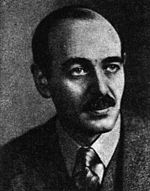Benjamin B. Rubinstein, Date of Birth, Place of Birth, Date of Death
TweetBenjamin B. Rubinstein
Finnish psychoanalystAbout Benjamin B. Rubinstein
- Benjamin Björn Rubinstein (April 12, 1905 in Helsinki, Finland – July 12, 1989 in New York City) was a Finnish Jewish–American physician and psychoanalyst. Benjamin B.
- Rubinstein was born in the Jewish community of Helsinki, and he attended school both in his home town and in Copenhagen.
- His native language was Swedish.
- In Helsinki University, he studied first history and philosophy, but after having read Totem and Taboo by Sigmund Freud, he changed to the Faculty of Medicine in order to become a psychoanalyst.
- He also worked as a research assistant to Ragnar Granit.
- Rubinstein attained the degree of Licentiate in Medicine in 1936, and studied neurology and psychiatry in the United Kingdom in 1937–1939.
- His supervising analyst was Eva Rosenfeld, a student of Freud. When the Winter War broke out in 1939, Rubinstein returned to Finland and served as a medic and a psychiatrist in the army.
- He married his cousin Dinorah Rosenthal in 1940. In 1947, Rubinstein and his wife moved to the United States to be educated at the Menninger Foundation in Topeka, Kansas, until 1953.
- Then he opened a private analytical practice in New York.
- Rubinstein and his wife become naturalized U.S.
- citizens in 1957. Benjamin B.
- Rubinstein wrote extensively on the philosophy of psychoanalysis, including articles on the mind–body dichotomy, motivation, metaphor, the logic of psychoanalytic explanations, and metapsychology.
- His collected papers were published in 1997: Psychoanalysis and the Philosophy of Science: Collected Papers of Benjamin B.
- Rubinstein, M.D.
Read more at Wikipedia


 Date of Birth:
Date of Birth:  Place of Birth: Helsinki, Uusimaa, Finland
Place of Birth: Helsinki, Uusimaa, Finland